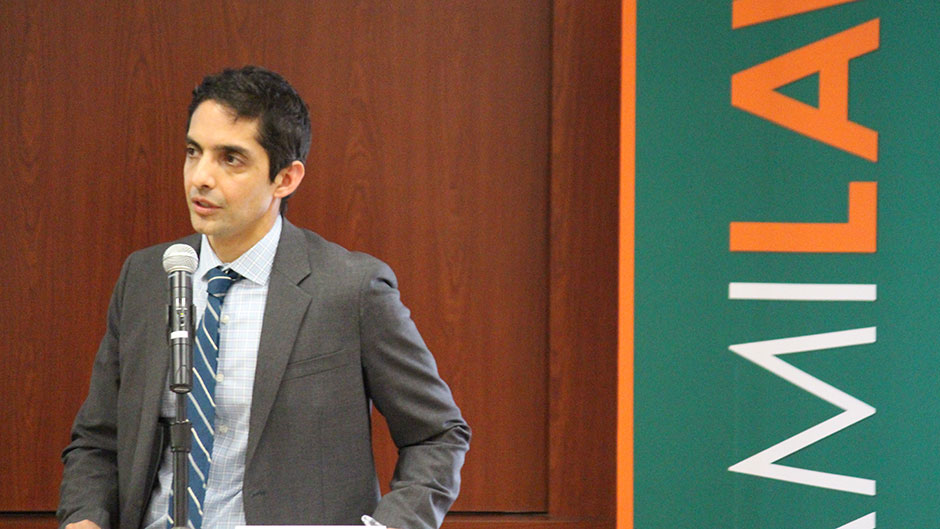“Animus breeds animus,” Yale Law Professor Muneer Ahmad told a packed classroom Monday. “And the cycle of animus needs to be broken.”
After a sleepless weekend during which Ahmad and his Yale law school students worked around the clock to assist those impacted by January 27 announcement of a Presidential Executive Order shutting the nation’s borders to noncitizens from seven predominantly Muslim countries, he remains hopeful.
Ahmad, a human rights and immigration law professor, shared his insights and experiences with a standing room only group of almost 200 students and faculty at the University of Miami’s School of Law.
Ahmad’s hope is bolstered by a preliminary win after a 24-hour session of legal drafting and argument before a U.S. District Court in New York with his law students and other groups like the American Civil Liberties Union. Yale’s law clinic is lead counsel on the nationwide class action lawsuit challenging the legality of the Executive Order. Over the weekend, a federal judge was persuaded to allow all refugees in the United States, or in transit, who have a valid U.S. visa, to not be turned back at the border. The ruling should keep any immigrants from being deported, for now, he said. But reports from around the country are that people, including lawful permanent residents, are still being detained and many have been prevented from boarding planes.
Ahmad’s discussion of the scope and legality of the executive orders – immigration ban, building a border wall, hiring 10,000 immigration officers, revoking federal grant money to cities who refuse to cooperate – sparked a spate of questions from the audience. He said, if allowed to stand as written, the orders will redefine our nation as one not open to immigrants. In addition to barring entry of noncitizens from Iraq, Syria, Iran, Libya, Somalia, Sudan, and Yemen for 90 days, the Executive Order suspends the refugee program, shuts down the Syrian refugee program indefinitely, and establishes a permanent “extreme vetting” procedure that targets Muslims who are already heavily screened.
Miami Law’s Immigration Clinic offers free and confidential legal consultations to UM students who are undocumented or are in Deferred Action of Childhood Arrivals status. Eligible and interested students should email immigrationclinic@law.miami.edu and ask for an appointment.
View video of the discussion.

